The Cellars Hohenort
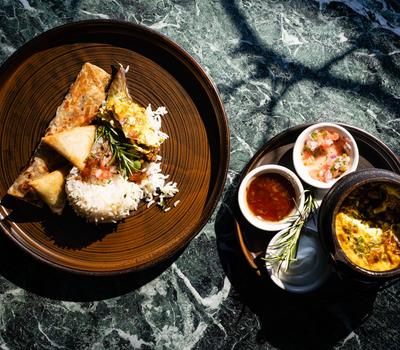
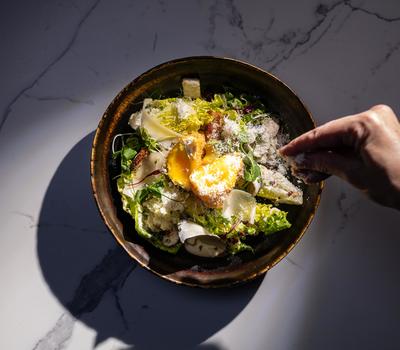
THE GOURMET MEANDER
The Cellars-Hohenort offers the ultimate base for a variety of gastronomic experiences – from farmer’s markets and wine estates to Cape Malay cuisine, and the artisan coffee and craft beer scenes.
Taste the bounty of Constantia at The Conservatory. The restaurant serves breakfast, lunch and dinner in the most beautiful of settings. The cuisine is innovative yet timeless, with an emphasis on fresh produce, much of which is grown in the hotel’s nine-acre garden.
The Cellars-Hohenort is set in the midst of Constantia, known as “Cape Town’s Vineyard”; from this location guests can explore Constantia, the Western Cape’s most historic wine region, through green corridors of vines and trees, for some of South Africa’s best wines. Many of these wine estates boast world-class restaurants, too.
For a sense of history, pay a visit to Groot Constantia; the more than 300-year-old wine farm has a museum, as well as award-winning wines, to explore. Then, for one of the best views in the valley, head to Constantia Glen. Afterwards, take the whole family for a picnic on the lawn at Buitenverwachting wine estate. Constantia is filled with sensory surprises to discover and enjoy.
From Constantia, there is easy access to other famous Cape wine regions, such as Stellenbosch, Franschhoek, Paarl and Hemel-en-Aarde.
Cape Town has a thriving market culture. Visitors can mingle with the residents and shop for seasonal produce and gourmet goods, while enjoying live music, craft beer and local wines.
Exploring the markets will take you from the forests of Tokai to the urban centre, and beyond. Visitors will get a snapshot of the city’s diverse and unique culture by visiting top markets such as the Bay Harbour Market in Hout Bay; the Neighbourgoods Market at the Old Biscuit Mill in Woodstock, where designers and artisan food producers meet; and the Oranjezicht City Farm, a community farming project in the inner city. This Saturday market offers beautiful views of both the mountain and the cityscape, as well as farm-fresh produce in a lively environment.
Your foodie journey continues into Bo-Kaap, Cape Town’s old Malay Quarter and one of the oldest parts of the city. It is a patchwork of brightly painted historic houses, cobbled streets and a network of restaurants and cafés. Here visitors can sample Cape Malay cuisine, traditional food originating in the 17th century.
If you happen to wander down Rose Street, you’ll not only find fragrant rotis, curries and samoosas, but also one of the most interesting coffee spots: the Haas Collective. Here, hand-roasted coffee and art meld in a unique experience. Cape Town has many other such gems, such as Truth Coffee Roasting, Yours Truly and Deluxe Coffee Works, to name a few.
Show More
Show Less
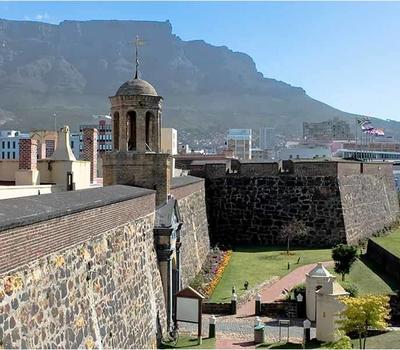
A CULTURAL PASSAGE
Discover Cape Town through its culture, history, art and design. Behold a landscape of juxtapositions: art deco and heritage buildings meet mirrored contemporary skyscrapers.
Imagine a place with world-class urban infrastructure, encircled by and threaded with natural beauty – there is no other city in the world positioned on the slopes of a national reserve, as Cape Town is in the Table Mountain National Park. Table Mountain is also the only one of the New7Wonders of the World in an urban area.
The Cellars-Hohenort is located in the leafy, green southern suburbs of South Africa’s oldest city, and there are numerous routes and avenues to follow to discover its secrets.
There are numerous tours available to experience the city’s inspirational architecture, iconic sites and vibrant populace; from Nelson Mandela tours and walking tours through the historic and photogenic Bo-Kaap to the Red Bus, a hop-on hop-off bus service that takes passengers to all the attractions, historic areas and most scenic views. There’s a mode of transport to suit any traveller or occasion, such as renting a vintage car, sidecar tours with Harley-Davidson, and personalised tours of the Cape’s wine regions. A must-try is The Franschhoek Wine Tram, which takes you through the beautiful Franschhoek Valley.
Cape Town boasts a treasure trove of art galleries, natural history institutions and the like. Listen to the whale calls in the special booth at the Iziko South African Museum, set in the historic Company’s Garden. Another highlight is the Planetarium at the museum, where the whole family can explore the world of astronomy.
There’s an incredible variety of family activities to discover, such as boating in the V&A Waterfront harbour, a trip to the Two Oceans Aquarium, visiting the historic naval base at Simon’s Town, or watching the fishermen of Kalk Bay steam into the harbour at day’s end with their catch.
Cape Town is alive with festivals, concerts and theatre. Our guests can make The Cellars-Hohenort their base to enjoy the plethora of events happening throughout the calendar year. One of the highlights is the annual Kirstenbosch Summer Concerts; these outdoor live music concerts feature renowned South African acts in one of the world’s most spectacular botanic gardens.
Show More
Show Less
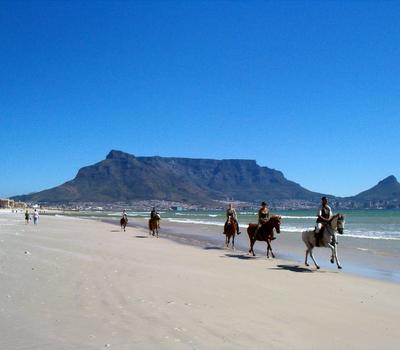
LET'S GO OUTSIDE
The Western Cape offers the ultimate escape for lovers of the outdoors: its diverse natural beauty encompasses fynbos-covered mountains, dramatic seascapes, tangled forests, spectacular reserves and botanic gardens – all within easy reach.
Discovering the outdoors begins in the nine-acre garden at The Cellars-Hohenort, which features the second-oldest camphor trees in South Africa, an enchanted forest, a vineyard, secret doorways, a rose garden and so much more. Regular garden tours are conducted for guests, uncovering the magic of one of the world’s most beautiful privately owned gardens.
There are a variety of trails in Constantia’s Green Belt, snaking through the area’s green heart. Hikers can soak up mountain views and jungle-like scenery while discovering hidden paths.
A short drive from The Cellars-Hohenort is the acclaimed Kirstenbosch National Botanical Garden. Set against the eastern slopes of Table Mountain, the beauty of the garden is renowned the world over for its indigenous plants, it’s just the place to picnic and dream. Additionally, soar above the trees for sightings of birds, flora and mesmerising mountain views with the new Kirstenbosch treetop canopy walkway.
With its iconic, table-like silhouette, Table Mountain and its surrounding national park also offer a range of trails, going beyond the famous summit (which visitors can access via the cable car, or for the intrepid, on a variety of hikes). Think full-moon hikes up Lion’s Head, fynbos-scented walks to Elephant’s Eye and sunset sojourns on Signal Hill.
The national park stretches all the way to Cape Point, on the edge of the peninsula. Journey here for staggering seaside cliffs, pristine mountain walks and white-sand beaches. Not to be missed is Boulders beach, where beach-goers share the sand with endangered African penguins; they can also be viewed in the protected areas via a boardwalk.
While the Cape Floral Kingdom displays an unparalleled diversity of flora throughout the year, in springtime the wild flowers bloom in beautiful, colourful displays. Travellers don’t have to go far to witness this annual event. Located just an hour from the city centre, Posberg in the West Coast National Park is filled with spring flowers from mid-August to the end of September.
A wonderful way to enjoy Cape Town’s natural beauty is to spend a day teeing off on one of the many beautiful golf courses.
With its spectacular scenery the Western Cape is a paradise for cyclists, and as such hosts a number of cycling events throughout the year. There are also incredible routes for mountain bikers.
Long-distance runners are spoilt for choice, too, with beautiful trails and official marathons, including the Two Oceans, which has been dubbed the “most beautiful marathon in the world”.
Adventure-seekers can take to the sky, too, with paragliding off Signal Hill, abseiling from the top of Table Mountain, skydiving on the West Coast, and so much more – plunging into the ocean depths for shark-cage diving, or skim above while kite-surfing.
Show More
Show Less
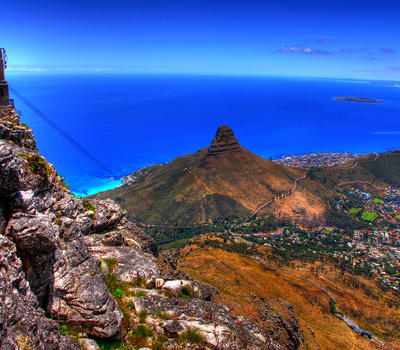
TABLE MOUNTAIN
Table Mountain is the most iconic landmark of South Africa.
It is also the country’s most photographed attraction and its famous cable car has taken millions of people to its top. Table Mountain has become the single most welcoming icon to not only our people, but travellers from all over the world. But this mountain hides many surprises that wait to be discovered.
It is much more than a scenic photograph background or a place from where you can take a breathtaking photo of Cape Town. There are about 2,200 species of plants found on Table Mountain and 1470 floral species. Many of these plants and flowers are endemic to this mountain.
The magnificent Kirstenbosch Botanical Gardens found on the eastern foot of the mountain. Founded in 1913, the garden that spans an area of 1300 acres includes a unique conservatory with plants from different parts of the world.
Besides the parks, the whole area has a biodiversity that is rare to find in other places on earth. Its many valleys and streams make it an idyllic getaway from Cape Town. The national park’s most unique feature is its fynbos vegetation that is displayed here better than anywhere in the world.
The Cape Floral region of the national park is one of the richest floral regions in the world. Over 70% of the flowers are endemic to the Table Mountain. It is no wonder that the mountain was chosen as one of the new seven world wonders.
Its fauna is no less thrilling either. Although animals such as the cape lion, mountain zebra or the leopard are no longer found here, the park is still home to caracals, rock hyraxes or chacma baboons.
The flat top peak of the mountain reaches 1,086 m above sea level, but being so close to the sea and to the city its features look more imposing.
Show More
Show Less
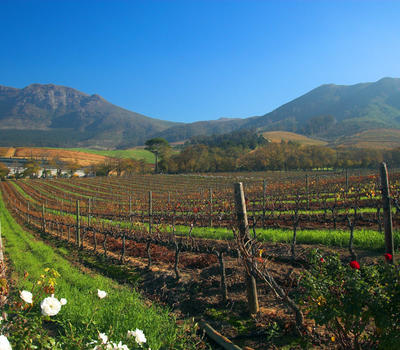
CONSTANTIA AND THE CONSTANTIA VALLEY WINE ROUTE
Taste the wines of the Constantia Valley, one of the oldest wine producing regions in South Africa.
Constantia’s history dates back to 1685 when Governor Simon van der Stel named his property Constantia after the daughter of his benefactor Commissioner Van Rheede who granted him a farm here. Governor Van der Stel planted orchards and vineyards on the farm thus making Constantia the oldest wine producing region in the Southern Hemisphere with an uninterrupted history of wine making.
Situated 15 kilometres from Cape Town’s city centre, and with the world-renowned Kirstenbosch Botanical Gardens on its doorstep, the Constantia of today shares its heritage and landscapes of unsurpassed beauty with the locals who have made it their home. The Constantia Valley receives a steady flow of visitors throughout the year who come to enjoy the country lifestyle conveniently located close to all major attractions.
The Constantia Valley has an appeal that offers something of interest to everyone, from award winning restaurants offering international flavours, luxurious boutique hotel accommodation with spas as well as quaint B&Bs. There are beautiful greenbelts to walk on, shops to explore, a brilliant zip lining adventure, mountain biking, horse riding, unique shops and a growing number of businesses who have chosen to escape the hustle and bustle of the city.
The Constantia Valley wine estates offer an array of experiences such as year round wine tastings and then picnics, live music and festivals in the warmer months.
Show More
Show Less
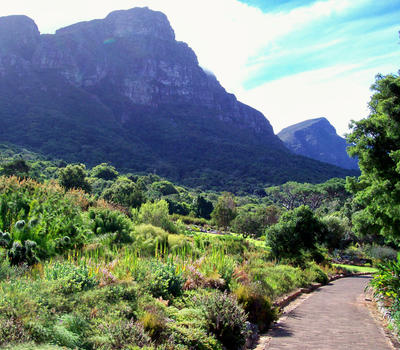
KIRSTENBOSCH BOTANICAL GARDENS
Kirstenbosch National Botanical Garden lives up to its reputation as the most beautiful garden in Africa and one of the great botanic gardens of the world. Few gardens can match the sheer grandeur of the setting of Kirstenbosch, against the eastern slopes of Cape Town’s Table Mountain.
Kirstenbosch was established in 1913 to promote, conserve and display the extraordinarily rich and diverse flora of southern Africa, and was the first botanic garden in the world to be devoted to a country's indigenous flora.
Kirstenbosch displays a wide variety of the unique plant life of the Cape Flora, also known as fynbos, including sugarbushes (Protea spp.), pincushions (Leucospermum spp.) and heaths (Erica spp.). Plants from all the diverse regions and biomes of southern Africa are also grown at Kirstenbosch, including a near-complete collection of cycads (Encephalartos spp.). The Botanical Society Conservatory is a custom-built glasshouse to grow and display plants from the arid regions that cannot survive outdoors. There are over 7 000 species in cultivation at Kirstenbosch, including many rare and threatened species. See more on the virtual tour.
More than just a garden, Kirstenbosch is part of a nature reserve. The 36 hectare garden is part of a 528 hectare estate that contains protected mountainside supporting natural forest and fynbos along with a variety of animals and birds. The Kirstenbosch Estate borders the Table Mountain National Park, and the Garden merges seamlessly with the natural fynbos and forest of the mountain.
Kirstenbosch lies in the heart of the Cape Floristic Region, also known as the Cape Floral Kingdom. In 2004 the Cape Floristic Region, including Kirstenbosch, was declared a UNESCO World Heritage Site – another first for Kirstenbosch. It is the first botanic garden in the world to be included within a natural World Heritage Site.
Kirstenbosch is the largest of a country-wide network of nine National Botanical Gardens administered by the South African National Biodiversity Institute (SANBI).
Show More
Show Less
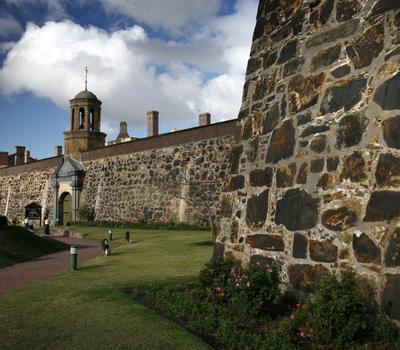
CASTLE OF GOOD HOPE
Built between 1666 and 1679 by the Dutch East India Company (VOC) as a maritime replenishment station, the Castle of Good Hope is the oldest surviving colonial building in South Africa.
From 1678 it was the centre of civilian, administrative and military life at the Cape, until the settlement grew and some functions and activities moved away from the Castle. Today the Castle is the seat of the military in the Cape, and houses the Castle Military Museum and Iziko Museums of Cape Town (William Fehr Collection).
The Castle of Good Hope is a service orientated public entity, striving to optimize its tourism potential and accessibility to the public and to preserve and protect its cultural and military heritage.
Show More
Show Less
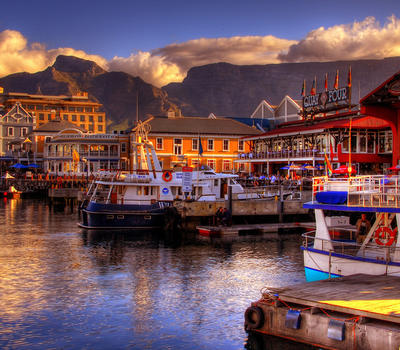
V&A WATERFRONT
Situated at the foot of Table Mountain, within a stone's throw from the Cape Town Stadium and in the heart of Cape Town's working harbour, the V&A Waterfront offers the visitor an abundance of unforgettable experiences.
Indoor shopping and entertainment venues seamlessly merge with ocean vistas and mountain views and the fresh sea breeze and warm African sun add zest to a cosmopolitan, vibrant atmosphere. More than 80 restaurants bring a fusion of international food, from rustic al fresco fish and chips to starched table-cloth cuisine.
Shopping isn’t the only activity that can be enjoyed at the V&A Waterfront. You can also find two cinema complexes (which include the luxury cinema, Scene) which feature the latest released films, housed within the Victoria Wharf Shopping Centre. The 123 hectare size property also has a world-class aquarium, the Two Oceans Aquarium and two museums; namely the Maritime and Chavonnes Battery museums. There are also guided and self-guided historical walking tours which the whole family can enjoy. The Cape Wheel is where you will be able to have an unsurpassed 360° view of the city. For the sports fan, the Springbok Experience Rugby Museum celebrates the history of the Springboks and South African rugby. This museum can be found on Portswood Ridge, outside the croquet lawn.
The outdoor Amphitheatre plays host to music, dance and theatre throughout the year and right next door is the nautical-themed play area for children. And of course, the working harbour is part and parcel of the V&A experience. Not only can you watch tug boats tow large cruise ships in and out of the bay, but there are a number of boat trips regularly available. The ferry that shuttles visitors to Robben Island leaves from Clock Tower Square. If you don’t want to miss out on your daily exercise, you will enjoy the variety of cycle rental options on the property, walk or jog on the 2.5 or 5km running route or just go for a relaxing walk on the beachfront board walk.
Show More
Show Less
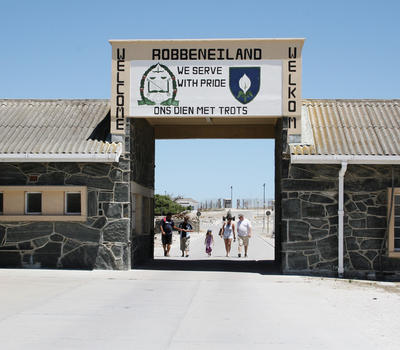
ROBBEN ISLAND
Robben Island needs no introduction with regards to the significance of its place in South Africa’s and indeed the world’s history. As “home” to one of the world’s most famous prisoners, statesmen and leader’s in Nelson Mandela. Robben Island is quite possibly most well known island-prison on the planet.
The island, a World Heritage Site some 9km (5.5mi) offshore from Cape Town, was dubbed “Robben” (the Dutch word for seal) Island by early settlers in reference to the seal population at the time. Over the centuries, the island has housed a prison, hospital, mental institution, leper colony and a military base. The afore mentioned Nelson Mandela spent 18 years of the 27 years of his incarceration imprisoned on the island.
The tour of the Robben Island Museum begins at the Nelson Mandela Gateway at the V & A Waterfront with a multimedia exhibition, a museum shop and restaurant to entertain you whilst you wait for the ferry to depart for the island. Please be sure to be there 30 minutes prior to the departure time, with the gates closing 10 minutes prior to departure.
Ferries depart at 9am, 10am, 11am, 1pm, 2pm and 3pm and each tour takes approximately 3.5 hours including the boat trip there and back (the ferry trips times vary from 30 minutes to an hour depending on the weather and the vessel). On the island, tours are all guided by former political prisoners of the island, offering the visitor a truly unique insight into the island’s history and personal accounts of prison life. The tour includes a visit to the maximum security prison, with the most poignant stop reserved for Mr. Mandela’s former cell, prepared exactly as it was when he was imprisoned here.
A bus takes you to the lime quarry where Mr. Mandela and his fellow prisoners did hard labour. Additional stopovers include the Kramat (shrine) of Tuan Guru (a Muslim leader), the Lepers’ Graveyard and the house where Robert Sobukwe lived in solitary confinement for nine years.
Show More
Show Less
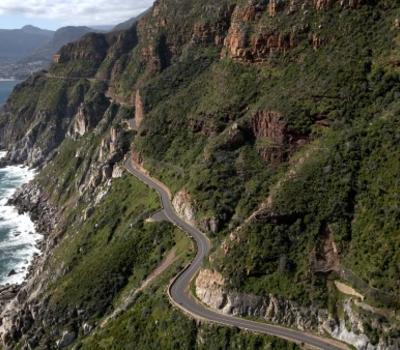
CHAPMAN’S PEAK
Chapman’s Peak Drive winds its way between Noordhoek and Hout Bay on the Atlantic Coast on the south-western tip of South Africa. Chapman’s Peak Drive is one of the most spectacular marine drives in the world.
The 9km route, with its 114 curves, skirts the rocky coastline of Chapman’s Peak (593m), which is the southerly extension of Constantiaberg and is a great hike for the energetically inclined.
Chapman’s Peak Drive is affectionately known as “Chappies” and is a must for anyone who is passionate about the majestic Cape Town scenery, with sheer drops to the sea below and towering mountains rising above you. The twists and curves in the road seem endless and it is a photographers dream. It is a paradise for motorists, sightseers, picnickers, runners, hikers and bikers (both the motorised and the manual varieties).
The drive offers stunning 180° views with many areas along the route where you can stop and take in the exquisite scenery or sit down for a relaxing picnic.
Show More
Show Less
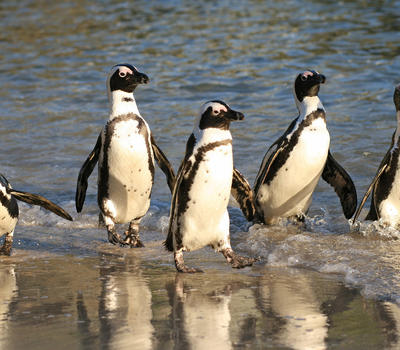
BOULDERS BEACH
Boulders Penguin Colony in Simons Town is home to a unique and endangered land-based colony of African Penguins. This colony is one of only a few in the world, and the site has become famous and a popular international tourist destination.
The Boulders section of TMNP consists of 3 pristine beaches, 1 penguin viewing area and 3 boardwalks. The boardwalks were built as a measure to allow for viewing of these wonderful birds, whilst keeping them safe from poking fingers, so please be sure to stay on the boardwalks at all times within the viewing area.
This beach is ideal for children as immense boulders shelter the cove from currents, wind and large waves - but please always take care. Don't touch or feed the penguins – they may look cute and cuddly but their beaks are as sharp as razors and if they feel threatened they have no qualms about nipping the odd finger or nose.
Show More
Show Less
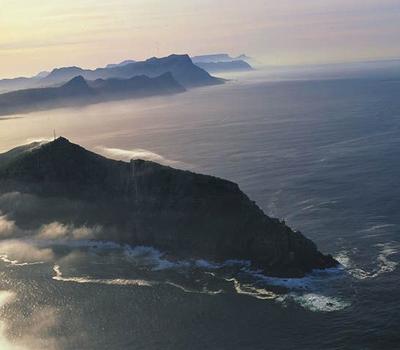
CAPE POINT
Named the ‘Cape of Storms’ by Bartolomeu Dias in 1488; the ‘Point’ was treated with respect by sailors for centuries. By day, it was a navigational landmark and by night, and in fog, it was a menace beset by violent storms and dangerous rocks that over the centuries littered shipwrecks around the coastline.
In 1859 the first lighthouse was completed; it still stands at 249 metres above sea-level on the highest section of the peak and is now used as the centralised monitoring point for all the lighthouses on the coast of South Africa. Access to this historical building is by an exhilarating 3 minute ride in the wheelchair accessible Flying Dutchman funicular that transfers visitors from the lower station at 127 metres above sea level, to the upper station at 286 metres above sea level.
Table Mountain National Park forms part of the Cape Floral Region, a World Heritage site. It includes the majestic Table Mountain chain, which stretches from Signal Hill to Cape Point, and the coastlines of the Cape Peninsula. This narrow stretch of land, dotted with beautiful valleys, bays and beaches, contains a mix of extraordinarily diverse and unique fauna and flora.
Show More
Show Less
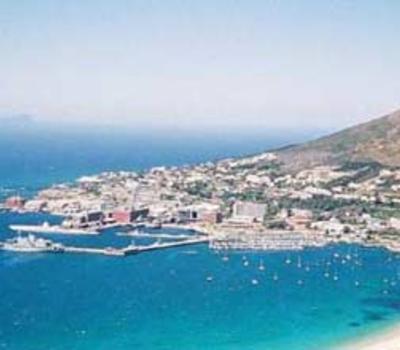
SIMON’S TOWN
The town officially called Simon’s Town, but often referred to as Simonstown, was originally named Simon’s Vlek after Simon van der Stel, the Dutch governor of the Cape Colony between 1677 and 1699, who surveyed the bay east of Cape Town in 1687 and earmarked it as a safe winter harbour during the months of May to September for which it was finally proclaimed in 1741.
Progress may have come slowly to Simon’s Town, but it has certainly left its mark. The town grew rapidly when it became a Royal Naval Base and the home of the South Atlantic Squadron under the second British occupation of the Cape in 1806, thanks largely to the construction of a huge man-made sandstone breakwater.
A famous resident of the town was Able Seaman Just Nuisance, RN, the only dog ever to be enlisted in the Royal Navy, to whom a statue has been erected in Jubilee Square. The sailors' had a favourite Great Dane who was a resident in the town, and request was sent to the British parliament asking for him to be enlisted in the Navy. Permission was granted and the dog was brought to the Recruiting Officer, who inquired: “Name?” “Nuisance, Sir”, the sailor replied. “First name?” “Just Nuisance, Sir,” the sailor stated, giving birth to a great legend.
Peopled with many descendants of the world’s sailing and exploring nations, as well as many slave families from the 17th century, and many of South Africa’s indigenous people’s who were drawn to the area from across Southern Africa, Simon’s Town has a rich and multicultural heritage, although it does somewhat resemble an old and quaint Victorian seaside town today.
An interesting 17th century Muslim Kramat (or grave) was discovered among the trees on a terrace above Runciman's Drive in the 1800s. Whoever is interred in the Kramat may be unknown, but its location appears to have a strange spiritual aura. Muslims still hold the site as 'Moestajap', a word used to express inexplicable spiritual happenings.
Another interesting building is the Dutch East India Company Hospital with three front-facing gables. Constructed on the mountainside above the Residency in 1764, it was here that author and playwright Edgar Wallace served as a medical orderly in the late 1890s.
The town has several museums which are worth visiting. Simon's Town Museum highlights events in the development of Simon's Town through the centuries. The South African Naval Museum in the Mast House (1815) alongside the Simon's Town Museum, displays models of ships and related maritime events.
The Heritage Museum in Amlay House on King George Street, also worth a visit, features many aspects of the Muslim community, and the nearby Mosque is absolutely beautiful.
Boulders Beach, a few kilometres to the south of Simon's Town is reputed to be amongst the very best beaches in the Cape, and is internationally renowned for being home to one of only three South African colonies of the African (Jackass) Penguins.
The False Bay Yacht Club is conveniently situated adjacent to the Simon's Town Waterfront Centre in the town. Boat charters and sea kayaking are some of the many activities offered from the centre, and professionally managed and run deepsea fishing and whale-watching charters are available.
The area deservedly draws many tourists, and if you are travelling to Cape Town it should be a ‘must-see’ on your itinerary. Good restaurants, pubs and places to stay abound.
Show More
Show Less




















